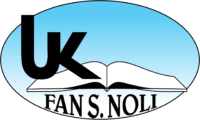SUMMER ACADEMY
Organizer:
"FAN S. NOLI" UNIVERSITY
Co-organizers:
UNIVERSITY “ST. CYRIL AND ST. METHODIUS”, VELIKO TARNOVO
ARISTOTLE UNIVERSITY OF THESSALONIKI
GOETHE-INSTITUTE, TIRANË
Period: May 7-17, 2024
Venue: “FAN S. NOLI” UNIVERSITY
MAIN FRAME
The Summer Academy "THE BALKANS IN THE ROOTS OF LINGUISTIC, LITERARY, HISTORICAL AND ETHNOGRAPHIC STUDIES" aims to increase cooperation between "Fan S. Noli" University, The Aristotle University of Thessaloniki, "St. Cyril and St. Methodius" University of Veliko Tarnovo, and Goethe Institute, within the framework of joint study courses. The curriculum is built on the roots of century-old traditions of philological, literary, ethnographic and historical development in the model of "The New Academy" of Moschopolis.
The Summer Academy is made possible thanks to the financial support of the Ministry of Education, Albania, within the program "Financing public HEIs, in joint projects within the framework of study programs internationalization, academic year 2023-2024".
CONTEXT
The Summer Academy aims to provide a complex picture of the historical, cultural, literary and philological developments with significant influence in the Balkans. It also aims to highlight the panorama of the active, intellectual and academic life of Moschopolis during XVII-XVIII centuries, when Moschopolis had the period of its great prosperity.
Moschopolis was a developed cultural center in Albania, founded in 1330, composed of Albanians, Aromanians, Slavs and Greeks. The symbolism of this summer academy in the Greek academic world derives from its original name of this center, πολις (in Greek city) or πολε (Sla. pole-field). [Μοσχόπολις is probably a reinterpretation of Slav. Vosko-pole < Visoko-pole]. During XVIII century XVIII, Moschopolis remained an outstanding example of knowledge and culture. It survived also as a good example of a common lifestyle and coexistence among different ethnic groups in harmony and continuous progress. From the establishment of "The New Academy" or Hellenikon Frontistêrion, the creation of a library and the operation of the only Printing House of the Ottoman Empire at the time, Moschopolis would be a unique multicultural triangle in the Balkans during this century. During the most successful and popular period of its academic life, a considerable number of young Albanians, Slavs, Greeks and Aromanians were educated there. They formed a European identity supported by Enlightenment ideas of positivist knowledge and it is precisely this model that is intended to be carried forward in this initiative.
It is this perspective, the Summer Academy THE BALKANS IN THE ROOTS OF LINGUISTIC, LITERARY, HISTORICAL AND ETHNOGRAPHIC STUDIES aims to revive the image of the New Academy by offering opportunities of cultural and academic interaction of ideas, thoughts, philosophies and languages that charachterise the studies in the Balkan languages, literature, history and ethnography.
The Summer Academy "THE BALKANS IN THE ROOTS OF LINGUISTIC, LITERARY, HISTORICAL AND ETHNOGRAPHIC STUDIES" aims to increase cooperation between "Fan S. Noli" University, The Aristotle University of Thessaloniki, "St. Cyril and St. Methodius" University of Veliko Tarnovo, and Goethe Institute, within the framework of joint study courses. The curriculum is built on the roots of century-old traditions of philological, literary, ethnographic and historical development in the model of "The New Academy" of Moschopolis.
The Summer Academy is made possible thanks to the financial support of the Ministry of Education, Albania, within the program "Financing public HEIs, in joint projects within the framework of study programs internationalization, academic year 2023-2024".
The Summer Academy aims to provide a complex picture of the historical, cultural, literary and philological developments with significant influence in the Balkans. It also aims to highlight the panorama of the active, intellectual and academic life of Moschopolis during XVII-XVIII centuries, when Moschopolis had the period of its great prosperity.
Moschopolis was a developed cultural center in Albania, founded in 1330, composed of Albanians, Aromanians, Slavs and Greeks. The symbolism of this summer academy in the Greek academic world derives from its original name of this center, πολις (in Greek city) or πολε (Sla. pole-field). [Μοσχόπολις is probably a reinterpretation of Slav. Vosko-pole < Visoko-pole]. During XVIII century XVIII, Moschopolis remained an outstanding example of knowledge and culture. It survived also as a good example of a common lifestyle and coexistence among different ethnic groups in harmony and continuous progress. From the establishment of "The New Academy" or Hellenikon Frontistêrion, the creation of a library and the operation of the only Printing House of the Ottoman Empire at the time, Moschopolis would be a unique multicultural triangle in the Balkans during this century. During the most successful and popular period of its academic life, a considerable number of young Albanians, Slavs, Greeks and Aromanians were educated there. They formed a European identity supported by Enlightenment ideas of positivist knowledge and it is precisely this model that is intended to be carried forward in this initiative.
It is this perspective, the Summer Academy THE BALKANS IN THE ROOTS OF LINGUISTIC, LITERARY, HISTORICAL AND ETHNOGRAPHIC STUDIES aims to revive the image of the New Academy by offering opportunities of cultural and academic interaction of ideas, thoughts, philosophies and languages that charachterise the studies in the Balkan languages, literature, history and ethnography.
THEMATIC FRAMEWORK OF THE SUMMER ACADEMY MODULES
- Cultural heritage, Ethnohistory, Language and Identity in the Balkans
- Languages in contact: language border and state border
- Linguistic and ethnographic “Balkanisms”
- Essential balkanisms in the languages of the region
- Balkan Literature and its Contribution to World Literature
- Comparative Balkan Folklore and Mythology
- Music in the Balkans as a tool to understand the construction of cultural traditions
- Education and Language Policies in Balkan States
- Integrated skills classes in Albanian Language
Extra curricular:
- Digital Humanities and Balkan Studies/ Digital fund of the “Thimi Mitko” Library (Click here)
- Balkan Art and Architecture: A Journey in Cultural Heritage (Expore Voskopoja) (Treni Cace) Lin Mosaic
- Balkan Cuisine and Its Cultural Significance
- Balkan Cinema: Themes and Influences “E kujt eshte kjo kenge?” (Click here)
- Balkan Music: Traditions, Fusion, and Contemporary Trends (Click here)
- Visits in the Middle Age Art Museum/ Archaeological Museum/ Gjon Mili Museum/ Vangjush Mio House/ Shtepia Rumune National Museum , Archeological Museum , Vangjus Mio House Museum , Gjon Mili Photography Museum , Shtepia Rumune
- Visits on the bilingual community Pustec Municipality/Museum of Stereo Spasse. (Click here)
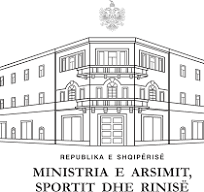
-Ministry of Education and Sport (https://arsimi.gov.al/)
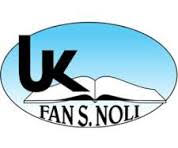
-"Fan S. Noli" University of Korca (http://www.unkorce.edu.al/)
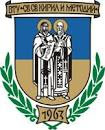
-University “St. Cyril and St. Methodius”, Veliko Tarnovo (https://www.uni-vt.bg/eng/)

-Aristotle University of Thessaloniki (https://www.auth.gr/en/)

-Goethe-Institute, Tiranë (https://www.goethe.al/sq/)
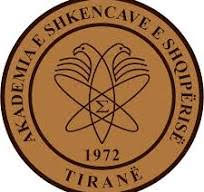
- Albanian Academy of Sciences (https://akad.gov.al/)

- “Thimi Mitko” Library of Korca (https://bashkiakorce.gov.al/site/articles.php?cid=153&t=&page=3)
In the context of Balkan studies, the academy aims to address the following:
- Identify the efforts of “Fan S. Noli” University, The Aristotle University of Thessaloniki, “St. Cyril and St. Methodius” Univerity of Veliko Tarnovo, and Goethe Institute, and respective Centers of the Balkan Studies, in support of the idea of recognition, cooperation, development and peaceful coexistence between peoples in the Balkans by combining knowledge, culture, tradition and art in a functional symbiosis. It also aims to coordinate the aforementioned within the framework of the agreements they have with relevant European institutions.
- Highlight the connection between a undeniably important past and a farsighted modernity in the Balkans, conveying the spirit of Moschopolis: the assimilation and transmission of Balkan cultural and ideological development, at the most important moments in the history of our continent.
- Enlighten the history of “The New Academy” model, since 1744, when a group of intellectuals founded in in Moschopolis, with an educational program similar to the developing academies in the most developed countries of Europe. The researchers, at the time, were outstanding personalities in the field of education, culture and sciences.
- Introduce new study perspectives for the interested students, out of the framework of traditional academic teaching, through integrating them in interactive learning activities through educational fieldwork visits and practical activities.
- Address a significant lack of interest and knowledge on the part of the younger generation regarding the Balkan studies and the studies of renowned contributors in the respective countries.
- Address the lack of intercultural and inter-linguistic communication between young people in the Balkan countries and young people interested in the Balkan studies.
OBJECTIVES AND AIMS OF THE SUMMER ACADEMY
The Summer Academy aims to increase the contribution of “Fan S. Noli” University to the internationalization of academic knowledge on the Balkans, through cooperation with The Aristotle University in Thessaloniki, “St. Cyril and St. Methodius” University of Veliko Tarnovo and the “Goethe” Institute, through joint study courses, built on the roots of a centuries-old Balkan tradition of philological development and historical sciences in the model of the “New Academy” of Moschopolis.
PROJECT OBJECTIVES
- Promote the basis of cultural, historical, ethnographic and linguistic contexts in the Balkans that connect the past with the present.
- Improve understanding of the above profiles in Balkan developments by sharing past and present knowledge between experts in the field, qualified academics and new students or alumni.
- Highlight the importance of works on Balkan studies and promote Balkan cooperation.
- Undertake initial steps towards designing an electronic database of literary resources on “Moschopoli”, by including information/literary/archival sources for the purpose of tracking, evaluating, engaging and referencing data.
- Promote the role of “Fan S. Noli” University as a promoter of international academic communication in the region regarding Balkan studies and boost interinstitution cooperation with the co-organizers.
- Increase the communication skills of the participants at the interpersonal, interpretative and presentation levels.
- Engage participants in intercultural communication, dialogue and exchange of best practices.
- Promote the studies and research on the Balkan studies in a more approachable way to the non-academic reader in social networks and media.
Estimated duration of activities: 9 days
ECTS: 6 ECTS (6 x 18 hours/ECTS = 108 hours)
60 hours in the auditorium (6 hours a day/ 3 curricular + 3 extracurricular)
48 hours of individual study
The academy has a 9-day academic structure.
The teaching is organized in lectures every day. Each session also includes different types of simulations, discussions, group work, research in libraries and archives, etc.
The curriculum of the Summer Academy consists of nine interrelated courses, followed by a series of extracurricular and cultural activities, within the theme included in each module.
At the conclusion of the scheduled training sessions, students will be awarded a certificate of participation in English, specifying the number of credits earned, as well as a description of the modules developed. They are required to attend at least 80% of these modules. Each module will be conducted in English and will be accompanied by extracurricular activities according to the nature of the module.
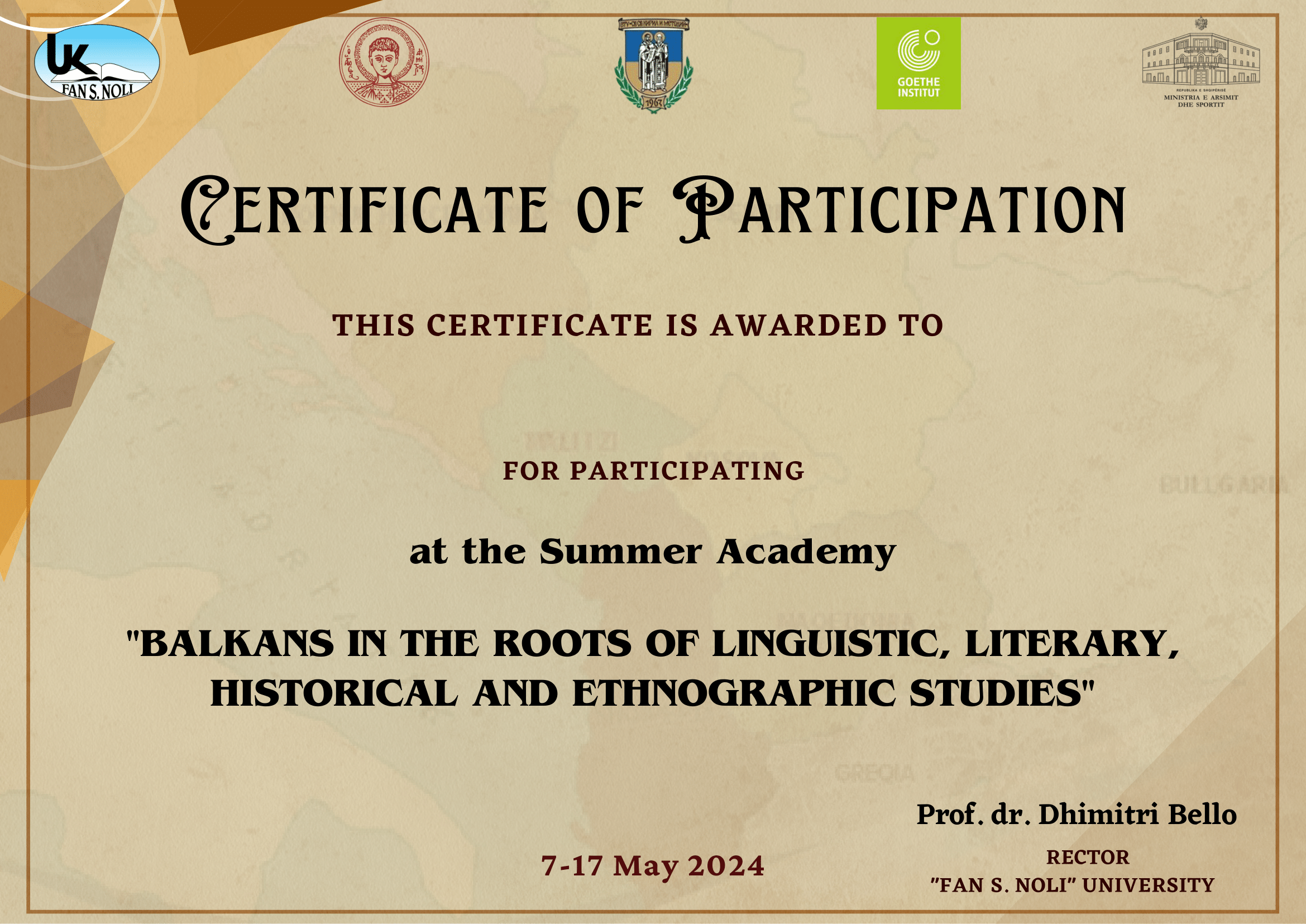

Prof. Dr. Dhimitri Bello is a distinguished academician and the current Rector of Fan S. Noli University in Korçë. His educational journey and qualifications reflect a deep commitment to the field of linguistics. Throughout his career, Professor Bello has been actively involved in various academic and administrative roles. Beyond his university affiliations, Professor Bello has been an active participant in editorial activities, serving on the editorial boards of several scholarly journals in both Albania and Bulgaria. His multilingual proficiency is notable, with fluency in Albanian, Russian, Bulgarian, Serbian, Macedonian, and Greek, along with a commendable command of English.
In terms of employment, Professor Bello has held various teaching positions, both internally and externally, showcasing his expertise in Balkan linguistics, Indo-European linguistics, and the history of language. Since October 2020, he has held the prestigious position of Rector at Fan S. Noli University in Korçë, where he continues to contribute to the academic and scientific development of the institution.
Academic Shaban Sinani is a prominent scholar in the field of cultural anthropology, currently serving as the Scientific Secretary at the Academy of Sciences since 2020. From 2016 to 2020, he held the position of Scientific Secretary in the Section of Social and Albanological Sciences at the Academy of Sciences of Albania.
From 1992 to 2016, he was a researcher at the Institute of Popular Culture (1992-1997) and then Head of the Department of Literary Folklore at this Institute (1997-1999). In the years 1999-2005, he was the General Director of the Archives of Albania. From 2005 to 2006 he was a researcher in the Department of Literary Studies at the Institute of Linguistics and Literature and in the period 2006-2007 Head of the Department of Literary Studies. During the years 1982-1994, he was a journalist and editor, as well as Assistant to the President of the State for cultural issues.
Professor Ali Jashari is a full-time faculty member at the Faculty of Education and Philology at the University of Korçë. Commencing his career as an Albanian language teacher, Professor Jashari served as a language specialist at the Pedagogical Cabinet in Korçë. From 1996 onwards, he became a language teacher, a trainer for continuous teacher education, department head, chair of the Faculty Council, vice-rector, dean, and ultimately the rector of Fan S. Noli University in Korçë.
Throughout his career, Professor Jashari has undertaken postgraduate specializations at institutions such as the University of North London and the University of Oxford (UK), the Aristotle University of Thessaloniki (Greece), and the College of Aarhus (Denmark). He has been a visiting lecturer at St. Clement of Ohrid University in Sofia, Neofit Rilski University in Blagoevgrad (Bulgaria), the University of Tirana, and has participated in various international projects. Professor Jashari's areas of expertise include lexicology, general linguistics, critical thinking in teaching, and lexicography. His multifaceted contributions to academia, both nationally and internationally, reflect a lifelong dedication to the advancement of linguistic studies and education.
Prof. dr. Bardhyl Musai is full time professor at the Faculty of Social Sciences, University of Tirana. He is researcher in the fields of educational sciences and educational policies, has devised, directed and implemented various programs, bringing innovation to the educational system in Albania and Kosovo. His numerous publications are used by students in faculties of education as well as in programs for the professional development of teachers and leaders of educational institutions, including those of mentors and leadership.
He has an experience of 39 years in education and over 22 years in university teaching and research. He has participated as a member of several working groups on educational reform in Albania, drafting legislation for pre-university and higher education, member of the Council for Higher Education and Science to the minister of education from 2006 till 2013, member of Higher Education Reform Experts (HERE), a TEMPUS initiative funded by EU. He has been also Chair of the Council for Accreditation of Higher Education from 2006 till 2014 and has been adviser to the prime Minister for the period 2009-2013.
Member of the Department of Linguistics and Literature. His research interests focus on the grammar of the Albanian language, the teaching of the Albanian language and semiotics. He has been teaching the following courses at postgraduate and undergraduate: Morphology of the Albanian language, Teaching of the Albanian language, Semiotics, Teaching methodology. He has published many publications in scientific journals. He has been coordinator and participant in various national and international conferences.
The head of Department of Linguistics and Literature, specialized in linguistic anthropology research with many publications in some prestigious scientific journals indexed in SCOPUS. Distinguished professor with 23 years of experience. She held Msc in Psycholinguistics and PhD in Ethno-linguistics at Tirana University. Actually, she has significant experience in Albanian Phonetics and Phonology, and Intercultural Communication and Albanian Language as a Second Language teaching. This experience is completed at “St. Kliment Ohridski” University in Sofia (Bulgaria) and “Aristotle” University in Thessaloniki (Greece).
Lecturer: Assoc. Prof. Vladimir Vladov, Ph.D.
Institution: St. Cyril and St. Methodius University of Veliko Tarnovo
D. Kohler. La littérature grecque moderne. Paris, 1985.Lavagnini B. La letteratura neoellenica. Milano, 1969.
Mirambel A. La littérature grecque moderne. Paris, 1965.
Politis L. History of Modern Greek Literature. Oxford, 1978 г.
Δημαράς Κ. Ιστορία της νεοελληνικής λογοτεχνίας από τις πρώτες ρίζες της ως την εποχή μας. Αθήνα, 2000.
Владов, В. Поетическият конкурс „Ралис“ и Григор Пърличев. Societas Classica.
Култури и религии на Балканите, в Средиземноморието и Изтока. Х, 2020 г.
Преводна рецепция на Европейските литератури в България. Т.6. Балкански литератури. С., 2004.
“Letërsia ballkanike dhe kontributi i saj në letërsinë botërore” nga Assoc. Prof. Vladimir Vladov, i Universitetit “St. Cyril and St. Methodius”, Veliko Tarnovo.
Lecturer: Assoc. Prof. Pavlin Chaushev Institution: St. Cyril and St. Methodius University of Veliko Tarnovo
vdikos 1996: Avdikos, E. To Paidi satin Paradosiaki kai tin Synchroni Koinonia (The child in traditional and modern society). Athens: Ellinika Grammata, 1996.Avdikos 2013: Evangelos Avdikos Vampire Stories in Greece and the Reinforcement of Socio-Cultural Norms Evangelos Avdikos, Folklore 124, 2013, 307–326.
Barber 1988: Barber, P. Vampires, Burial, and Death: Folklore and Reality. New Haven, CT and London: Yale University Press, 1988.
Blum and Blum 1970: Blum, R, and Blum, E. The Dangerous Hour: The Lore of Crisis and Mystery in Rural Greece. London: Chattoand Windus, 1970.
Bourdieu 1986: Bourdieu, P. ‘The Forms of Capital’. In Handbook of Theory and Research for the Sociology of Education, edited by J. Richardson, 241–58. New York: Greenwood, 1986.
Burkhart 1966 : Burkhart, D. Vampirglaube und Vampirsage auf dem Balkan. - In: Beitrдge zur Sьdosteuropa-Forschung. München, 1966, 211-252.
Campbell 1964: Campbell, J. Honour, Family and Patronage. Cambridge: Cambridge University Press, 1964.
Cremene 1981: Cremene, Ardien. La mythologie du Vampire en Roumanie (The mythology of the vampire in Romania). Monaco, Éditions Du Rocher, 1981.
Danforth 1982: Danforth, Loring M. The Death Rituals of Rural Greece. Princeton, NJ: Princeton University Press, 1982.
Dukova 1997: Dukova, U. Die Bezeichnungen der Demonen im Bulgarischen. Specimina phiIologiae slavicae. Bd. 115. Munchen, 1997.
Du Boulay 1998: Du Boulay, J. ‘The Greek Vampire: A Study of Cyclic Symbolism in Marriage and Death’. In The Vampire: A Casebook, edited by Alan Dundes, 85–108. Madison: University of Wisconsin Press, 1998.
Gennep 1960: Gennep, Arnold Van. The Rites of Passage. Chicago: University of Chicago Press, 1960.
Görog-Karady 1992: Görog-Karady, Veronica. ‘Ethnic Stereotypes and Folklore’. In Folklore Processed: In Honour of Lauri Honko on his
6oth Birthday, 6th March 1992, edited by Reimund Kvideland, 114–26. Helsinki: Suomalaisen Kirjallisuuden Seura, 1992.
Hart 1992: Hart, Laurie Kain. Time, Religion, and Social Experience in Rural Greece. Lanham, MD: Rowman and Littlefield, 1992.
Hufford 1982: Hufford, D. The Terror that Comes in the Night: An Experience-centered Study of Supernatural Assault Traditions. Philadelphia: University of Pennsylvania Press, 1982.
Kassis 1981: Kassis, K. I Lographia tis Mesa Manis [Mesa Mani folklore]. Vol. 2. Athens, 1981.
Lawson 1910: Lawson, J. C. Modern Greek Folklore and Ancient Greek Religion. Cambridge: Cambridge University Press, 1910.
Megas 1979: Megas, G. „Paradoseis peri Astheneion” (Traditions about diseases). Laographia 7 (1923): 465–520. Ellinikai Eortai kai Ethima Laikis Latreias [Greek feasts and customs of folk worship]. Athens, 1979.
Mouzakis 1989: Mouzakis, Stelios. Vrikolakes [Vampires]. Athens: Hestia, 1989.
Murgoci 1998: Murgoci, A., The Vampire in Romania, University of Wisconsin Press, 1998, 12–34.
Oinas 1985: Oinas, Felix J. Essays on Russian Folklore and Mythology. Colombus, OH: Slavica, 1985.
Öktem 2009: Öktem E. “Balkan Vampires Before Ottoman Courts,” Cesnur: Centro Studi Sulle Nuove Religioni, www.cesnur.org/2009/balkan_vampires.htm, 2009
Petzoldt 1995: Petzoldt, L. Kleines Lexikon der Demonen und Elementargeister. Munchen, 1995.
Politis 1904: Politis, N. Paradoseis, tomos B [Traditions, volume B]. Athens: Istoriki Erevna, n.d. First published 1904.
Stewart 1991: Stewart, C. Demons and the Devil. Princeton, NJ: Princeton University Press, 1991.
Thrakiotis 1991: Thrakiotis, K. Laiki Pisti kai Thriskeia stin Thraki [Folk belief and worship in Thrace]. Athens: Rissos, 1991.
Turner 1967: Turner, V. The Forest of Symbols. Ithaca, NY: Cornell University Press, 1967.
Weigand 1894: Weigand, G. Die Aromune: Ethnographisch-philologisch-historische Untersuchungen, Leipzig: Ambrosius Barth, 1894.
Wundt 1900: Wundt, W. Völkerpsychologie. Teil III. Mythus und Religion. Leipzig, 1900.
Γεωργοπαπαδάκου 1980: Γεωργοπαπαδάκου, Α. Το μεγάλο λεξικό της νεοελληνικής
Extracurricular activities: Early Traces of Albanian Folklore, Visit to Train Cave and Ziçisht Village
“Folklori dhe mitologjia krahasuese ballkanike” nga Assoc. Prof. Pavlin Chaushev po nga Universiteti “St. Cyril and St. Methodius”
Lecturer: Academic Shaban Sinani [9:00-10:15]
Institution: Albanian Academy of Sciences
Presentation (Click here)
- Høeg, Carsten. 1925. Les Saracatsans. Paris: Librairie ancienne Édouard Champion.
- Todorova, Maria. 1997. Imagining the Balkans. NY: Oxford University Press.
- Wace, A.J.B. and Maurice Scott Thompson. 1914. The nomads of the Balkans, an account of life and customs among the Vlachs of Northern Pindus. London: Methuen & Co.
"Trashëgimia kulturore, etnohistoria, gjuha dhe identiteti në Ballkan”, referuar nga Acad. Shaban Sinani, Akademia e Shkencave e Shqipërisë
Lecturer: Assoc. Professor Georgios Agelopoulos [10:15-11:30]
Institution: Aristotle University of Thesaloniki
- Høeg, Carsten. 1925. Les Saracatsans. Paris: Librairie ancienne Édouard Champion.- Todorova, Maria. 1997. Imagining the Balkans. NY: Oxford University Press.
- Wace, A.J.B. and Maurice Scott Thompson. 1914. The nomads of the Balkans, an account of life and customs among the Vlachs of Northern Pindus. London: Methuen & Co.
“Vllehët dhe Sarakatanët në etnografinë ballkanike të fillimit të shekullit të 20-të”, Assoc. Professor Georgios Agelopoulos, Universiteti Aristoteli, Selanik
Lecturer: Prof. dr. Ali Jashari Institution: “Fan S. Noli” University
Presentation (Click here)
- Høeg, Carsten. 1925. Les Saracatsans. Paris: Librairie ancienne Édouard Champion.
- Todorova, Maria. 1997. Imagining the Balkans. NY: Oxford University Press.
- Wace, A.J.B. and Maurice Scott Thompson. 1914. The nomads of the Balkans, an account of life and customs among the Vlachs of Northern Pindus. London: Methuen & Co.
“Idiomat ndërgjuhëshe në gjuhën shqipe dhe në gjuhë të tjera indoevropiane”, nga prof. dr. Ali Jashari në fshatin turistik të Voskopojës
Lecturer: Prof. Pandeli Pani [9:00-10:10]
Institution: Goethe Institut
Peter Auer,/ Jürgen Erich Schmidt: Language and Space: An International Handbook of Linguistic Variation; De Gruyter Mouton, 2010,.Pandeli Pani: Some Some differences between varieties of Albanian with special reference to Kosovo; in International Journal of the Sociology of Language 178, 2006, 55-73
Tomasz Kamusella: The idea of a Kosovan language in Yugoslavia’s language politics, IJSL 2016; 242: 217–237
Robert Greenberg: Language and identity in the Balkans: Serbo-Croatian and its disintegration; Oxford University Press, 2004.
Jelena Ćalić: Pluricentricity in the classroom : the Serbo-Croatian language issue for foreign language teaching at higher education institutions worldwide, Sociolinguistica - International Yearbook of European Sociolinguistics / Internationales Jahrbuch für europäische Soziolinguistik 2021; 35(1):113-140
Michel Bert/James Costa: What Counts as a Linguistic Border, for Whom and with What Implications? Exploring Occitan and Francoprovençal in Rhône-Alpes, France; In C. Llamas & D. Watt (Eds.), Language, Borders and Identity (pp. 186–205). Edinburgh: Edinburgh University Press.
”Gjuhët në kontakt: Kufiri gjuhësor dhe kufiri shtetëror”, nga prof. Pandeli Pani, Instituti Goethe
Lecturer: Jorida Tollkuci Institution: Head of “Thimi Mitko” Library
Extracurricular activities:
Balkan Cinema: Themes and Influences “E kujt është kjo këngë?”
https://www.oecd.org/pisa/publications/education-in-the-western-balkans-764847ff-en.htm
https://www.unesco.org/en/articles/multilingual-education-key-quality-and-inclusive-learning
"Fondi digjital i Bibliotekës "Thimi Mitko"
Lecturer: Prof. dr. Dhimitri Bello Institution: “Fan S. Noli” University
Presentation (Click here)
Extracurricular activities: Visit to the Macedonian Minority of Pustec Municipality.
https://www.oecd.org/pisa/publications/education-in-the-western-balkans-764847ff-en.htm
https://www.unesco.org/en/articles/multilingual-education-key-quality-and-inclusive-learning
“Ballkanizma” gjuhësore dhe etnografike” me ligjërues prof. dr. Dhimitri Bello, Universiteti “Fan S. Noli" u mbajt në fshatin Gollomboç, Pustec.
Institution: “Fan S. Noli” University of Korça
“Muzika në Ballkan si një mjet për të kuptuar ndërtimin e traditave kulturore” me ligjërues dr. Pandi Bello, Universiteti “Fan S. Noli”
Lecturer: Prof. dr. Bardhyl Musai
resentation (click here)
https://www.oecd.org/pisa/publications/education-in-the-western-balkans-764847ff-en.htm
https://www.unesco.org/en/articles/multilingual-education-key-quality-and-inclusive-learning
"Politikat arsimore dhe gjuhësore në vendet e Ballkanit” nga prof. dr. Bardhyl Musai, Universiteti i Tiranës
https://bashkiakorce.gov.al/site/articles.php?cid=232
https://discoverkorca.al/listing/gjon-mili-photography-museum/
https://issuu.com/bashkiakorce/docs/guida_e_kor____s_shqip
https://albania360.com/where-to-go/visit-the-national-museum-of-medieval-art-in-albania/
https://www.visitalbania.app/listing/national-museum-of-medieval-art/
Local Media Promotion
Përfundon Akademia Verore/ Ndahen certifikatat për studentët pjesmarrës"Pak nga të gjitha" - Akademia verore
“Ballkanizma gjuhësore dhe etnografike”/ Akademia Verore zhvendoset në fshatin Gollomboç të Pustecit
Akademia Verore në ditën e tretë/ Referon për studentët akademiku Shaban Sinani
“Akademia Verore”/ “Ballkani në rrënjët e studimeve gjuhësore, letrare, historike dhe etnografike”
University Official Social Media
Ceremonia e shpërndarjes së Certifikatave të Pjesëmarrjes në Akademinë Verore: "Ballkani në rrënjët e studimeve gjuhësore, letrare, historike dhe etnografike" organizuar nga Universiteti "Fan S. Noli".”Politikat arsimore dhe gjuhësore në vendet e Ballkanit” është moduli VIII i Akademisë Verore që u mbajt nga prof. dr. Bardhyl Musai, Universiteti i Tiranës.
Akademia Verore 2024-Modulin VII “Muzika në Ballkan si një mjet për të kuptuar ndërtimin e traditave kulturore” me ligjërues dr. Pandi Bello, Universiteti “Fan S. Noli”.
Akademisë Verore 2024-Moduli: “Ballkanizma” gjuhësore dhe etnografike” i Akademisë Verore 2024, me ligjërues prof. dr. Dhimitri Bello, Universiteti “Fan S. Noli" u mbajt në fshatin Gollomboç, Pustec.
”Gjuhët në kontakt: Kufiri gjuhësor dhe kufiri shtetëror” ishte tema e modulit V të Akademisë Verore “Ballkani në rrënjët e studimeve gjuhësore, letrare, historike dhe etnografike" i mbajtur nga prof. Pandeli Pani, Instituti Goethe.
Nga veprimtaritë jashtëkurrikulare të Akademisë Verore “Ballkani në rrënjët e studimeve gjuhësore, letrare, historike dhe etnografike"
Studentët e Akademisë Verore ndoqën leksionin “Idiomat ndërgjuhëshe në gjuhën shqipe dhe në gjuhë të tjera indoevropiane”, nga prof. dr. Ali Jashari në fshatin turistik të Voskopojës.
”Trashëgimia kulturore, etnohistoria, gjuha dhe identiteti në Ballkan” dhe “ Vllehët dhe Sarakatanët në etnografinë ballkanike të fillimit të shekullit të 20-të” ishin temat e moduleve të ditës III të Akademisë Verore, referuar nga Acad. Shaban Sinani, Akademia e Shkencave e Shqipërisë dhe Assoc. Professor Georgios Agelopoulos, Universiteti Aristoteli, Selanik.
Veprimtari jashtë kurrikulare e ditës II të Akademisë Verore- vizitë studimore në Parkun Kombëtar të Prespës.
“Letërsia ballkanike dhe kontributi i saj në letërsinë botërore” nga Assoc. Prof. Vladimir Vladov, i Universitetit “St. Cyril and St. Methodius”, Veliko Tarnovo dhe “Folklori dhe mitologjia krahasuese ballkanike” nga Assoc. Prof. Pavlin Chaushev po nga Universiteti “St. Cyril and St. Methodius” ishin modulet e ditës II të Akademisë Verore 2024.
Ceremonia e hapjes së Akademisë Verore "Ballkani në rrënjët e studimeve gjuhësore, letrare, historike dhe etnografike" i organizuar nga Universiteti "Fan S. Noli" në bashkëpunim me Universitetin “St. Cyril and St. Methodius”, Veliko Tarnovo, Universitetin “Aristoteli”, Selanik dhe Institutin “Goethe”, Tiranë.
CEREMONIA E SHPËRNDARJES SË CERTIFIKATAVE TË PJESËMARRJES PËRMBYLLI PUNIMET E AKADEMISË VERORE TË ORGANIZUAR NGA UNIVERISTETI “FAN S. NOLI” NGA DATA 7-17 MAJ 2024
Prof. as. dr. Eris Rusi (erusi@unkorce.edu.al)
Dr. Olger Brame (obrame@unkorce.edu.al)
Msc. Eftiona Bylykbashi (ejosifi@unkorce.edu.al)
